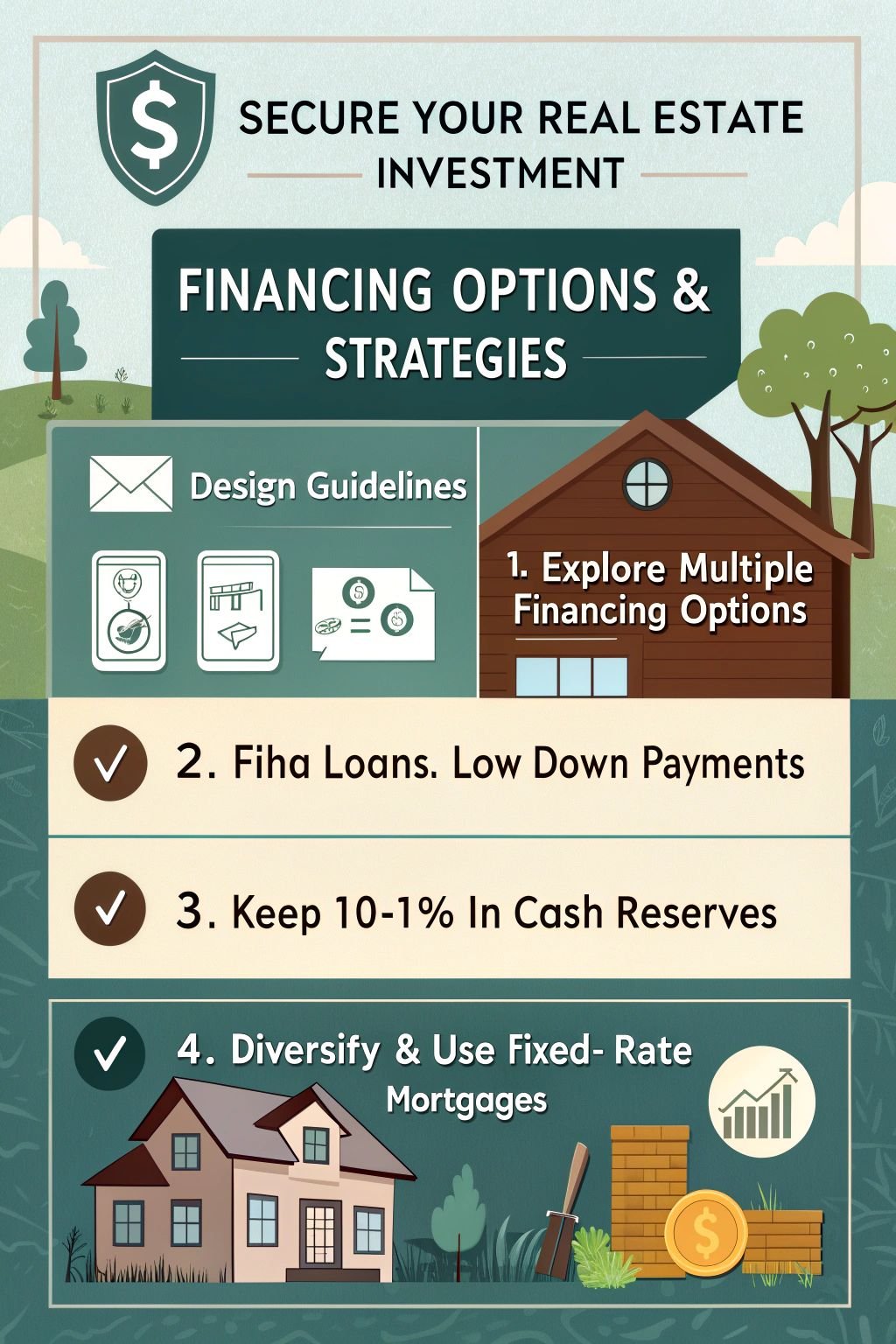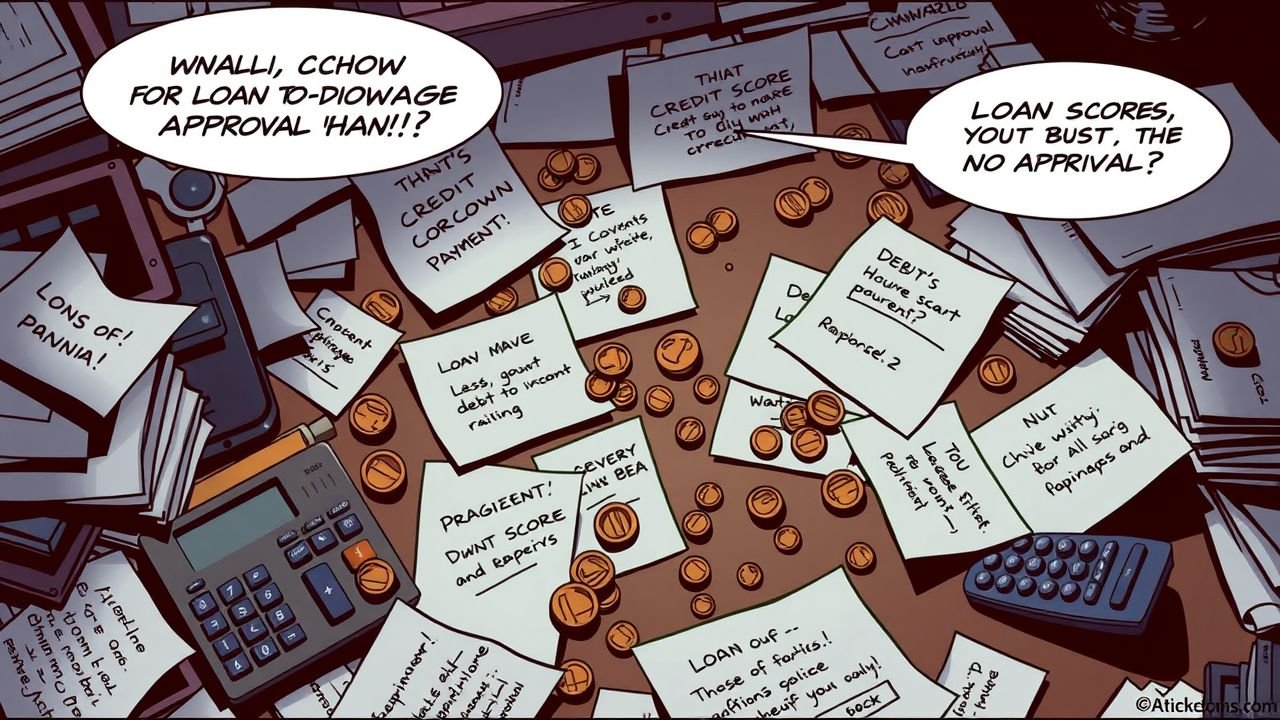Investing in real estate can help you build wealth, but finding the right money to start is hard. 3 Many people want to buy investment properties but don’t know how to secure the funds they need. 2
Real estate investment financing has many options, from bank loans to private lenders. You’ll learn about different ways to finance your investments and the best strategies to use.
Let’s get started and make your real estate goals happen! 1
Key Takeaways
- Multiple Financing Options: Choose from conventional mortgages, FHA loans, hard money loans, private money loans, and home equity loans to fund your real estate investments.
- Down Payments and Credit Scores: Conventional loans usually need a 20%-30% down payment and a credit score of at least 620. FHA loans allow down payments as low as 3.5% with a minimum score of 580.
- Alternative Loans for Speed: Hard money loans offer quick funding with interest rates up to 18%, ideal for flipping properties. Private money loans come from individuals and have flexible approval.
- Cash Reserves and Credit Building: Keep 10-15% of your portfolio in cash reserves and maintain a strong credit profile by paying bills on time and keeping credit use below 30%.
- Manage Risks Effectively: Diversify your investments, use fixed-rate mortgages, and maintain low debt-to-income ratios to protect your real estate investments from market changes and high debt.

Understanding Investment Properties

When you buy an investment property, you’re purchasing a home or building to make money. You can earn through rental income or by the property’s value going up.
Definition of an Investment Property
An investment property helps you earn passive income. You can buy a home, apartment, office space, or even raw land. These properties generate rental income and may appreciate in value over time. 2 To finance an investment property, you typically need a down payment of at least 15%. 1 Your credit score plays a big role in securing a mortgage loan with favorable terms.
Different types of investment properties include residential and commercial real estate. Residential properties are homes or apartments that people rent. Commercial properties include offices, retail spaces, and warehouses.
Raw land is another option, though it doesn’t produce income until developed. When you invest in real estate, you calculate your return on investment (ROI) by dividing the net operating income by the property’s total mortgage value.
Investing in real estate involves more than just buying property; it’s about building a future of financial stability.
Reasons to Invest in Real Estate
Investing in real estate can offer you several benefits that enhance your financial portfolio. For starters, owning property diversifies your investments, which lowers your overall risk if other markets take a hit. 3 Real estate acts as an inflation hedge because property values and rental incomes usually go up with inflation. This helps your investment keep pace with rising costs.
Using a conventional mortgage or other financing options lets you leverage borrowed funds to potentially boost your returns. Over the long term, properties generally appreciate in value, providing growth to your investment.
Rental properties give you steady rental income each month, creating a reliable stream of passive income. Moreover, real estate investing comes with tax benefits like deductions for mortgage interest and property taxes, and options like 1031 exchanges allow you to defer taxes when reinvesting in similar properties.
Conventional Financing Options

Conventional mortgages are a solid choice for funding your real estate investments. They offer competitive interest rates and typical down payments to help you get started.
Conventional Mortgages
You might need a down payment of 20% to 30%. 4 Lenders check your credit score and review your credit history. You also must show six months of cash reserves. Choose between fixed-rate mortgages, which keep payments steady, and adjustable-rate mortgages (ARMs), which start with lower rates that can change.
If you’re buying a high-value property, jumbo loans can cover amounts above federal limits.
Federal Housing Administration (FHA) Loans
FHA loans help many people buy homes. If your credit score is at least 580, you can put down just 3.5%. Scores between 500 and 579 need a 10% down payment. These loans are great for first-time buyers and real estate investors looking to secure affordable financing. 5
FHA loans have loan limits in 2024 from $498,257 in low-cost areas to $1,149,825 in high-cost regions. You must pay two types of mortgage insurance premiums (MIPs) with an FHA loan.
This insurance protects lenders if you miss payments. The FHA Home Affordable Modification Program (HAMP) is paused until April 30, 2025. 5
FHA loans make homeownership accessible for many who might not qualify for other mortgages.
Explore your financing options and discover which one fits your investment goals best.
Alternative Financing Options

Don’t let standard loans slow you down—consider hard money lenders or tap into your home’s equity. These alternative options can help you secure your next investment property.
Hard Money Loans
Hard money loans can be a lifesaver when you need funds fast for a real estate deal. These loans come with high interest rates, often up to 18%, but they provide quick access to money lenders. 6 They are perfect for flipping properties because the loan approval is based on the property’s appraised value. 6 Typically, you can borrow between 50% and 70% of the property’s worth.
This makes hard money loans ideal for urgent opportunities like auctions or fix-and-flip projects. With hard money lenders, you can secure the cash you need without waiting for traditional mortgage approvals.
Private Money Loans
Private money loans come from individual lenders, such as friends or family, instead of banks. These loans offer flexible approval, making it easier to secure funding without extensive paperwork.
Interest rates are usually higher, and there are fewer borrower protections. You can use private money loans for quick real estate deals or house flipping projects. No-doc loans are accepted, so you don’t need to provide detailed financial documents. 7
Building strong relationships with private lenders can lead to better loan terms. These lenders understand the value of rental income and property appreciation. Private money loans are ideal for investors who need fast financing and are willing to pay higher rates.
Keep in mind the risk of foreclosure if you can’t repay, so plan your investments carefully.
Home Equity Loans and Lines of Credit
Shifting from private money loans, home equity loans and HELOCs offer flexible ways to finance your property investments. With a home equity loan, you can borrow a lump sum by using up to 80% of your home equity.
This option gives you a fixed rate, making it easier to plan your payments. On the other hand, a HELOC works like a credit card. You can borrow what you need, up to your credit limit, and only pay interest on what you use.
Interest rates for HELOCs generally range from 3% to 5%, providing a cost-effective way to access funds. 8
Using a home equity line of credit (HELOC) can help you manage rental property expenses or invest in property rehabilitation. A cash-out refinance is another option. It offers fixed rates but may extend your mortgage term.
Keeping at least 20% equity in your property helps you avoid mortgage insurance costs. Compare loan terms and rates from different mortgage lenders to find the best deal. By leveraging your home’s equity, you can secure the financing you need to grow your real estate investments. 9
Commercial and Business Loans

Need funds for a larger property? Explore commercial mortgages or SBA loans to support your real estate plans.
Commercial Mortgages
Commercial mortgages finance multi-unit homes or business properties. They offer terms from five to twenty years and have higher borrowing limits. Competitive mortgage rates make them attractive for real estate investing. 10
To secure a commercial mortgage, you need a strong credit score and a large down payment. The approval process is lengthy and requires meeting strict qualifications. Be ready for significant closing costs and ensure your debt-to-income ratio meets lender standards. 11Small Business Administration (SBA) Loans
After commercial mortgages, SBA loans provide another option for funding your investment property. These loans range from $500 to $5.5 million. 12 You can use them for long-term fixed assets and operating capital.
SBA loans offer competitive terms with lower down payments, making it easier to manage your debts. They also have flexible overhead requirements, which helps when you’re handling rental income and property management.
If your business is affected by a disaster, disaster assistance loans are available to support you. This flexibility makes SBA loans a strong choice for your real estate investing needs. 12
Innovative Financing Strategies

Thinking outside the box? Try seller financing or lease options to fund your property dreams. Or gather investors through real estate crowdfunding and watch your investment grow—don’t wait, explore these strategies now!
Seller Financing
Seller financing lets you buy a property without going through a bank. The seller acts as the lender, making the process simpler. 13 You might need a smaller down payment and don’t have to worry as much about your credit score.
This option is great if traditional loans aren’t working for you.
Terms are flexible, so you and the seller can agree on a payment plan that fits your budget. Keep an eye out for balloon payments, though. These large payments come due at the end of the loan term and can be risky if you’re not prepared.
Make sure you understand all the details before signing anything.
Seller financing can speed up your real estate investment. It opens doors to opportunities you might not find with conventional loans. Next, explore lease options and other creative financing strategies to boost your investment game.
Lease Options
Lease options let you control an investment property without buying it right away. You can cut initial costs by up to 50%. 14 This means you lease the home now and agree to purchase it later.
While renting, you earn rental income and save for a down payment. Make sure your lease agreement clearly outlines the purchase price and lease terms. 13 Lease options are a smart way to invest in real estate with less money upfront.
Crowdfunding for Real Estate
Connecting lease options with new investment methods, crowdfunding for real estate is a game-changer. You and other investors pool your funds to buy properties together. This spreads out your risk and helps diversify your investment portfolio.
Since the JOBS Act of 2012, even non-accredited investors like you can join in. 15 Platforms such as Crowdstreet, Fundrise, and YieldStreet make investing easy and accessible. Crowdfunding REITs offer different risks and returns compared to traditional REITs, giving you more choices.
With real estate investing through crowdfunding, you can start building your investment property portfolio without needing a huge down payment. It’s a smart way to earn passive income and benefit from property appreciation together.
Factors Influencing Loan Approval

Your credit score, down payment, and debt-to-income ratio are crucial for loan approval—curious how they affect your investment? Keep reading!
Credit Score Requirements
A good credit score helps you qualify for better loan terms. For conventional mortgages, you need at least a 620 credit score. If your down payment is less than 25%, aim for a score of 700 or higher.
This makes lenders more confident in your ability to repay.
FHA loans are more flexible with credit scores. You can qualify with a score of 500 if you put down 10%. If your score is 580, the down payment drops to 3.5%. VA loans also require a minimum credit score of 620, offering benefits to eligible veterans.
Keeping your debt-to-income ratio low boosts your chances of approval. Focus on building a strong credit profile to access the best financing options for your investment property. 16Down Payment Amounts
Most conventional loans need a 20% down payment. Some may require up to 30%. 17 If your debt-to-income ratio is strong, lenders might let you pay less. Keeping the loan below 80% of the property’s value usually means at least 20% down.
A higher DSCR can lower your down payment. This helps you avoid private mortgage insurance. Consider using a home equity loan or a cash-out refinance to gather funds.
Debt-to-Income Ratios
Once you’ve figured out your down payment, it’s time to look at your debt-to-income ratio. This ratio shows how much of your income goes to paying debts. For conventional loans, your DTI should not exceed 45%. 18 There are two parts: Front-End DTI, which includes housing costs like your mortgage and property taxes, and Back-End DTI, which covers all monthly debts, such as credit card payments and other loans.
Fannie Mae allows up to 75% of your gross rental income to count towards your DTI. Keeping your DTI low helps you secure better loan terms and manage your investment property effectively. 19
Tips for Securing Financing

Boost your credit and save for a down payment to increase your loan approval chances. Compare different loan options to find the best rates and terms for your investment.
Building a Strong Credit Profile
Building a strong credit profile is key to getting the best home loan. 20 Pay all your bills on time to keep your credit score high. Late payments can lower your score and make lenders hesitant.
Consistent payment histories show you’re reliable.
Keep your credit utilization below 30%. This means using less than 30% of your available credit on credit cards. For example, if you have a $10,000 limit, try to owe no more than $3,000.
A lower ratio shows you manage credit well. Also, diversify your credit mix with credit cards and installment loans. This variety can boost your credit score. 21
Avoid opening multiple new accounts at once. Each new application can lower your score slightly. Maintain a good balance between credit and debt-to-income ratio (DTI). Lenders look at these factors when you apply for a home loan.
Stay disciplined and watch your credit profile grow stronger.
Understanding the Importance of Cash Reserves
Keeping cash reserves is crucial for your investment property. Aim for 10-15% of your active portfolio. 22 Use demand accounts or money market accounts to store your reserves. This money helps cover unexpected costs like repairs or vacancies.
It also strengthens your credit score and debt-to-income ratio (DTI), making loan approval easier.
With solid cash reserves, you can act fast on new real estate opportunities. Whether you’re house flipping or seeking passive income, having funds ready lets you seize deals before others.
Cash reserves also reduce the risk of over-leveraging, protecting your investments during market volatility. 23 Stay prepared and watch your real estate investing thrive.
Comparing Loan Terms and Rates
After securing your cash reserves, it’s time to compare loan terms and rates. Look at conventional mortgages, FHA loans, VA loans, and jumbo loans to find what fits your needs. 24 Fixed-rate mortgages keep your interest the same, making it easier to plan your payments.
Adjustable-rate mortgages (ARMs) might start lower but can change over time, affecting your monthly costs.
Check the loan’s amortization period and any prepayment penalties. A shorter period means higher payments but less interest overall. Get pre-approved to see your options and compare offers from different lenders. 24 Pay attention to your debt-to-income ratio and credit score, as these affect your rates. Whether you choose a home equity loan or a seller financing option, understanding these terms helps you make a smart investment.
Potential Risks and How to Mitigate Them

Real estate can throw some curveballs—prices can drop and debts might rise. Shield your investment by keeping your borrowing in check and setting aside a rainy day fund.
Market Volatility
Market ups and downs can worry you. But investing in real estate helps lower these risks. 25 Unlike the stock market, property values don’t swing as wildly. When you own an investment property, you gain stability.
Rental income keeps cash flowing even when prices fluctuate.
Holding onto your property longer gives you time to ride out tough times. Over years, property appreciation can boost your investment. Real estate investing offers a safer path compared to other volatile markets.
By choosing the right investment property, you protect your money from sudden changes.
Over-leveraging
Piling up too many loans can sink your investment fast. Keeping your loan-to-value (LTV) ratio at or below 80% is key. 26 Stretching to 100% sounds tempting, but those higher interest rates and fees eat into your profits.
Plus, if rental income dips, you might struggle with your debt-to-income ratio (DTI) and face foreclosure risks.
Stay smart by managing your down payment and avoiding over-leveraging. Use tools like a home equity line of credit (HELOC) to keep your investments balanced. Don’t let high LTV ratios jeopardize your financial planning.
Next, let’s explore the legal and tax implications of your investment choices. 27Legal and Tax Implications
Follow financing rules, zoning laws, and other regulations to keep your investment safe. 28 Non-compliance can lead to fines or delays. When you sell your investment property, capital gains taxes will apply.
Holding the property longer can lower these taxes. Depreciation is another tax benefit you can use to reduce your real estate taxes. 29 These strategies help you save money and increase your profits from rental income.
Understanding Real Estate Investment Risks

Real estate investing has its challenges. Property values might drop, lowering your investment property’s worth. 27 Rental income can decrease if rental rates fall. Changes in the neighborhood can also impact your property’s value.
Rising interest rates make home equity loans and HELOCs costlier, increasing your debt-to-income ratio. Dealing with difficult tenants can lead to unexpected expenses and stress.
To manage these risks, diversify your investments across different areas and property types. Carefully screen tenants to avoid problems down the line. 27 Lock in fixed-rate mortgages to keep your financing stable, even if rates rise.
Keep cash reserves to handle unexpected costs and market changes. By taking these steps, you can protect your investment and benefit from property appreciation over time.
Conclusion
Choosing the right financing option is key to your real estate success. From traditional mortgages to creative seller financing, there’s a path that fits your needs. Strengthen your credit and save for a down payment to open more doors.
Stay informed and manage risks to keep your investment safe. Explore these strategies and watch your investment grow.
FAQs
1. What financing options can I use to invest in real estate?
There are plenty of ways to finance your investment property! You can go for an FHA loan or a VA loan if you qualify. Thinking about tapping into your home’s equity? A HELOC or a cash-out refinance might be just what you need. And hey, don’t forget seller financing or even peer-to-peer lending. Each option has its perks, so choose what fits your situation best!
2. How important is my credit score when buying an investment property?
Oh, your credit score is a big deal! It impacts the kind of loans you can get and the interest rates you’ll pay. A higher score can mean lower closing costs and better terms. So, before you dive into real estate investing, make sure your credit score is in good shape. It’s like the secret sauce for securing great financing options.
3. What role does rental income play in real estate investing?
Rental income is your bread and butter! It helps cover your mortgage, property management fees, and other expenses. Plus, it can boost your cash flow and overall return on investment. So, when you’re house flipping or buying an investment property, consider how much rental income you can generate. It’s a game-changer for your financial strategy.
4. How can I manage property appreciation effectively?
Property appreciation is awesome, right? To make the most of it, keep an eye on the real estate market and choose locations with growth potential. Regular maintenance and upgrades can also boost your property’s value. And don’t forget to analyze data on local trends to predict how your investment will grow over time. It’s all about smart planning!
5. What strategies can help secure my real estate investment?
Securing your investment is all about smart strategies. Start with a solid down payment to reduce your debt-to-income ratio. Use property management to keep things running smoothly and ensure steady rental income. Consider a home equity loan or HELOC for extra funds, and always keep some savings aside for unexpected costs. Act now and lock in the best financing options before the market shifts!
References
- ^ https://www.rocketmortgage.com/learn/investment-property
- ^ https://www.vintti.com/blog/what-is-an-investment-property (2023-12-21)
- ^ https://www.rocketmortgage.com/learn/benefits-of-real-estate-investing (2024-02-29)
- ^ https://www.investopedia.com/articles/investing/021016/complete-guide-financing-investment-property.asp (2024-06-17)
- ^ https://www.investopedia.com/terms/f/fhaloan.asp
- ^ https://www.har.com/ri/3482/hard-money-loans-and-alternative-financing-options
- ^ https://www.offermarket.us/blog/private-money-lenders (2024-04-16)
- ^ https://www.jenmcfadyen.com/imjenblog/how-to-use-a-heloc-to-finance-real-estate-investments
- ^ https://www.bankrate.com/home-equity/home-equity-loan-investment-rental-property/ (2024-08-26)
- ^ https://academic.oup.com/book/11390/chapter/160049683
- ^ https://www.bankofamerica.com/smallbusiness/business-financing/commercial-real-estate-loans/
- ^ https://www.sba.gov/funding-programs/loans
- ^ https://ideaexchange.uakron.edu/cgi/viewcontent.cgi?article=1445&context=honors_research_projects
- ^ https://rewbcon.com/creative-financing-unconventional-ways-to-fund-your-real-estate-deals
- ^ https://www.nar.realtor/crowdfunding
- ^ https://www.nashvillesmls.com/blog/investment-property-loans.html (2024-11-11)
- ^ https://www.offermarket.us/blog/dscr-loan-down-payment-requirements
- ^ https://realestatefinancialplanner.com/debt-to-income/
- ^ https://www.nitra.com/resources/understanding-how-debt-to-income-ratio-impacts-your-mortgage-how-to-improve-it (2024-10-25)
- ^ https://prmcapital.net/2024/10/10/how-to-build-a-strong-credit-profile-essential-tips-for-new-construction-home-builders/ (2024-10-10)
- ^ https://www.anchorloans.com/blog/top-strategies-for-financing-real-estate-investments-in-2024 (2024-08-19)
- ^ https://realestateinvestingtoday.com/the-importance-of-cash-reserves/ (2024-05-16)
- ^ https://www.ameripriseadvisors.com/kelsey.lovett/insights/how-to-establish-a-cash-reserve/
- ^ https://www.rentastic.io/blog/comparing-loan-options-finding-the-right-financing-solution-for-your-investment (2024-11-19)
- ^ https://www.crowdstreet.com/resources/investment-fundamentals/mitigate-market-risk-with-real-estate-investing
- ^ https://www.bestevercre.com/blog/the-dangers-of-over-leveraging-understanding-the-risks-of-100-financing-for-real-estate-investors (2023-05-12)
- ^ https://www.gatsbyinvestment.com/education-center/risks-real-estate-investing (2024-05-17)
- ^ https://news.miami.edu/law/stories/2024/11/understanding-real-estate-investment-legal-considerations-with-an-mls.html (2024-11-21)
- ^ https://randacpas.com/tax-benefits-and-risks-to-consider-in-real-estate-investments/ (2024-07-12)





















